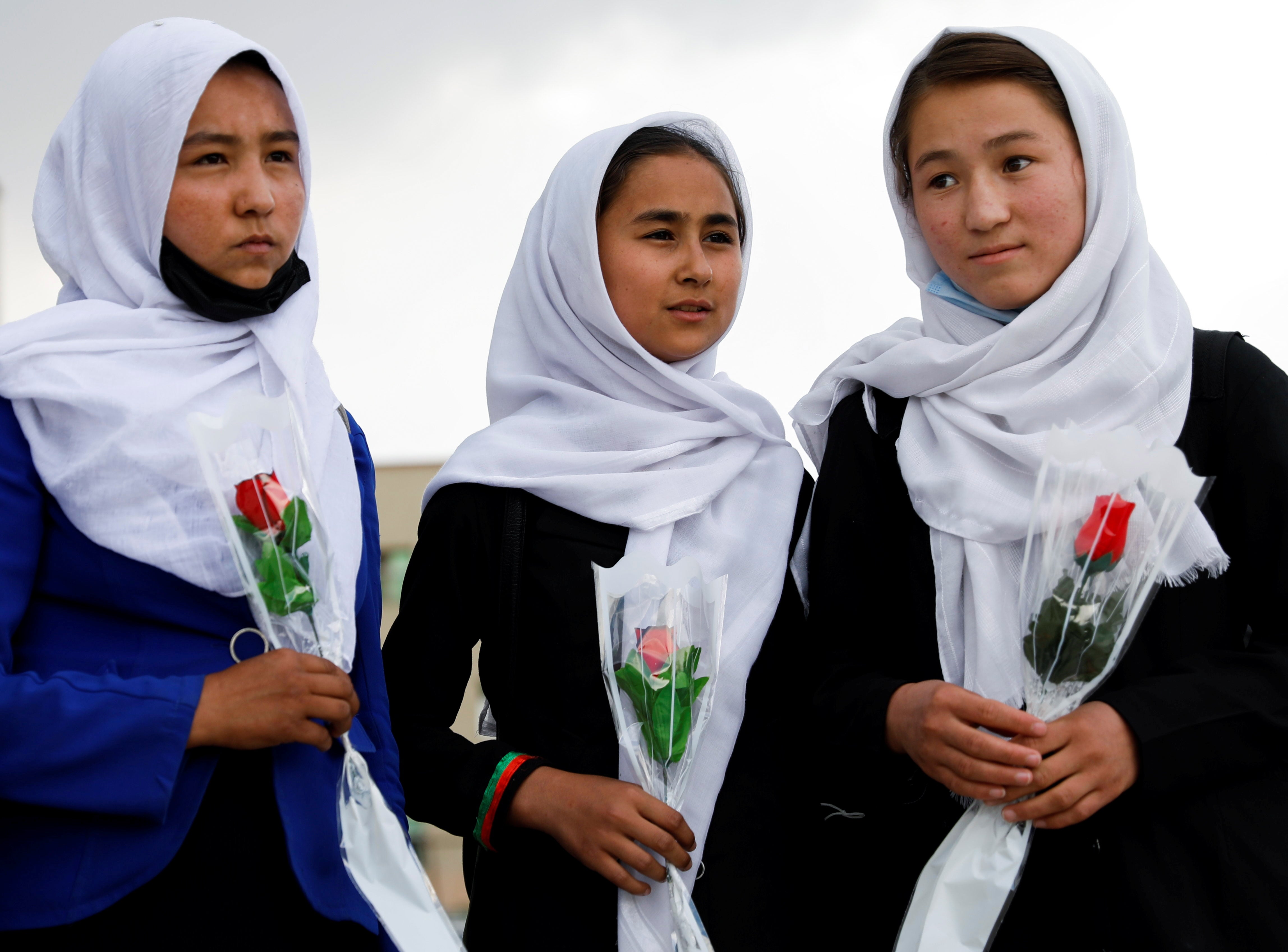British general plays key role in Afghanistan-Pakistan talks as international troops prepare to leave
Talks took place just two days after 85 dead after a bomb attack on an Afghanistan girls’ school

The head of the British military, General Sir Nick Carter, is said to be playing a key role in bringing together the Afghan government and Pakistani security chiefs as US-led international forces prepare to leave Afghanistan and the country faces an uncertain future.
Gen Carter was in Kabul this week for a meeting between commanders of the Pakistani military – elements of which have long been accused of supporting and arming the Taliban during the conflict – and Afghanistan’s president and vice-president.
The role of Carter and his team in the mediation has not been publicised by the British government.
There are currently 750 British troops in Afghanistan, on a training mission. They, along with about 7,000 other non-American forces, are expected to leave at least a month earlier than the symbolic departure date of 11 September declared by the US president, Joe Biden.
The Independent understands that months of confidential talks have been taking place to facilitate negotiations between senior Afghan and Pakistani military officers and officials, with British involvement, after it became clear that the US intended to end the longest war in its history by pulling out its remaining troops.
The Afghan president, Ashraf Ghani, has kept in regular personal contact with Gen Carter, the UK’s chief of the defence staff, who he has known for a long time.
A senior Afghan official said: “General Carter has played an important part in getting us and the Pakistanis together. It is not easy to have trust with the recent history between the two countries. We do not know what’s going to happen in the future; we have great worries.
“We think there’s a bit of sensitivity in London over it all among some people, not wanting to be seen to be too involved. But it’s important that the British and Carter continue. It is a constructive role.”
Gen Carter was present at the meeting between President Ghani, the vice-president, Amrullah Saleh, and the head of the Pakistani army, General Qamar Bajwa. General Faiz Hameed, the head of Pakistan’s Inter-Services Intelligence (ISI), was also present. The ISI, in particular, has been repeatedly charged over the years with backing the Taliban and other insurgent groups, including the Haqqani network.
Mr Saleh, a former head of Afghanistan’s National Directorate of Security, thanked Gen Carter after the meeting for his “facilitating role”.

The office of Mr Ghani said: “The president met with General Qamar Jawaid Bajwa, the Pakistan army chief, and General Carter, British army chief. During the meeting they discussed the peace process, relations between Afghanistan and Pakistan, and Pakistan’s role in the peace process and stopping violence in Afghanistan.”
The meeting in the Afghan capital took place just two days after one of the most horrific atrocities in recent years, even by the violent standards of the Afghan conflict, targeting schoolgirls in the city. The number of dead rose to 85, with another 147 injured, after the school in the Dasht-e-Barchi neighbourhood was targeted by a car bomb.
Gen Carter served extensively with the International Security Assistance Force in Afghanistan, including as head of regional command south, based in Kandahar. During that time, he built up extensive contacts among senior Afghan military officers and their Pakistani counterparts, as well as Afghan tribal leaders and politicians.
Last month, after President Biden announced that he was continuing with Donald Trump’s decision to withdraw all troops from Afghanistan, Gen Carter said that he had hoped for a different outcome. He pointed out that the reason for the western presence in support of the Afghan government was to prevent the country becoming an ungoverned space from which terrorist attacks could be launched.
Gen Carter said: “We went into Afghanistan back in 2001 to prevent international terrorism ever emerging from Afghanistan. In the last 20 years, there has been no international terrorist attack mounted from Afghanistan. I think that is a great tribute to our armed forces and, of course, to the armed forces of the Nato countries that have been committed to this.”
Following the meeting in the Afghan capital, the Pakistani military issued a statement: “A peaceful Afghanistan means a peaceful region in general and a peaceful Pakistan in particular. We will always support an ‘Afghan led-Afghan owned’ peace process based on mutual consensus of all stakeholders.”
The withdrawal of US-led forces follows an agreement between the Trump administration and the Taliban that took place in the capital of Qatar, Doha, and was presented effectively as a fait accompli to the Afghan government in February last year. The insurgents were supposed to stop” their bombings and shootings while talks continued and prisoners were exchanged.
The vast majority of Taliban detainees, including the “high value”, “hardcore” ones, have been released.
Attacks on international troops have dwindled significantly, but those on Afghan government forces and civilians have continued. Some of the deaths have been targeted assassinations of civic society leaders, human rights workers, academics and journalists.
Under the deal struck between the Taliban and the Trump administration, American troops were supposed to have pulled out by the beginning of May.
In the past, the Taliban warned that they would resume attacks if the withdrawal was delayed. The Pakistani military, according to reports, is trying to persuade the Taliban to desist from resuming hostilities.
Join our commenting forum
Join thought-provoking conversations, follow other Independent readers and see their replies
Comments
Bookmark popover
Removed from bookmarks